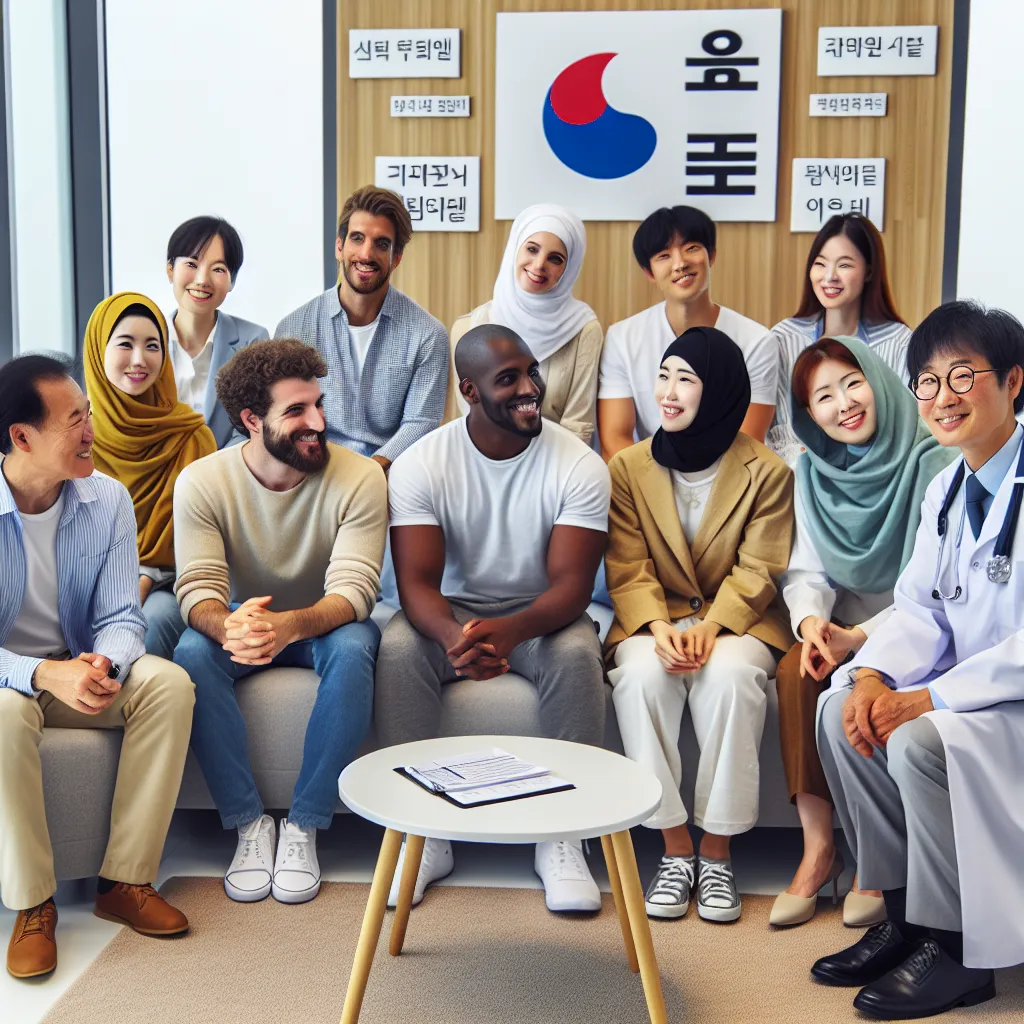Health is a universal concern that affects us all, regardless of where we are in the world. When it comes to living in a new country like Korea, understanding the healthcare system and how to access medical services is crucial. Navigating a foreign healthcare system can be daunting, but fear not! In this blog post, we will explore the ins and outs of the healthcare system in Korea, common medical conditions you may encounter, how to access healthcare services as a foreigner, and tips for effective communication with healthcare providers. So, if you’re feeling overwhelmed or unsure about healthcare in Korea, fret not – we’ve got you covered! Let’s dive in and learn how to take care of your health needs while living in this beautiful country.

Understanding the Healthcare System in Korea
Hey there! Today, let’s dive into the fascinating world of healthcare in Korea. The healthcare system in Korea is known for its efficiency and accessibility. Did you know that Korea boasts one of the highest doctor-to-patient ratios in the world? With approximately 12 doctors per 1,000 people, you can rest assured that you’re in good hands when it comes to medical care in Korea. 🏥💉
The Dual System in Korean Healthcare
One of the key features of the Korean healthcare system is its dual system, which consists of both public and private healthcare providers. This dual system allows patients to choose between visiting public hospitals, which are often more affordable, or private clinics, which may offer more specialized care. The choice is yours! 💼💊
National Health Insurance (NHI) System
In Korea, healthcare is largely funded by the National Health Insurance (NHI) system. Nearly 97% of the population is covered by the NHI, ensuring that almost everyone has access to quality healthcare services. Plus, with the convenience of advanced medical technology and modern facilities, you can expect top-notch treatment during your visit to a Korean healthcare facility. 🏨💡
Efficiency and Accessibility
When it comes to seeking medical care in Korea, you’ll find that the process is streamlined and efficient. From making appointments to receiving treatment, everything is designed to be as hassle-free as possible. And don’t worry about the language barrier – many healthcare providers in Korea speak English, making it easier for expats and tourists to communicate their medical needs. 🌟🗣️
Alternative and Complementary Therapies
In addition to traditional Western medicine, Korea also offers a wide range of alternative and complementary therapies, such as acupuncture, herbal medicine, and chiropractic care. This holistic approach to healthcare ensures that patients have access to a variety of treatment options to suit their individual needs. 🌿💆♂️
So, whether you’re a resident or just visiting Korea, rest assured that the healthcare system here has got you covered. With its efficient dual system, widespread insurance coverage, and innovative medical technologies, you can feel confident knowing that your health is in good hands. Stay healthy and take care! 💪🩺
Common Medical Conditions in Korea
Hey there, folks! Today, let’s dive into some common medical conditions you might come across in Korea. From seasonal allergies to digestive issues, let’s explore what you need to know to stay healthy and happy while living or traveling in Korea. 🌸💊
Seasonal Allergies
First up, let’s talk about seasonal allergies. In Korea, fine dust and yellow dust from China can exacerbate allergy symptoms, affecting many individuals, especially during the spring and fall seasons. 🌬️🤧 If you find yourself sneezing, experiencing a runny nose, or having itchy eyes, it might be due to these pesky allergens. Make sure to check the daily air quality levels and consider wearing a mask when outdoors to protect yourself.
Digestive Issues
Next on our list is digestive issues. Korean cuisine is delicious and diverse, but it may take some time for your stomach to adjust, especially if you’re not used to spicy foods or fermented dishes like kimchi. 🍲🔥 If you’re experiencing stomach discomfort, bloating, or irregular bowel movements, it could be a sign of gastritis or irritable bowel syndrome (IBS). Be mindful of your diet, stay hydrated, and consider incorporating probiotics to support your gut health.
Skin Conditions
Moving on to skin conditions, Korea’s skincare industry is renowned worldwide, but that doesn’t mean everyone has flawless skin. Acne, eczema, and psoriasis are common skin issues that many people face. 🧴✨ Whether it’s due to stress, pollution, or hormonal changes, seeking advice from a dermatologist can help you manage and treat these conditions effectively.
Mental Health
Another prevalent health concern in Korea is mental health. With the fast-paced lifestyle and societal pressures, many individuals experience stress, anxiety, and depression. 🧠💔 It’s essential to prioritize your mental well-being and seek professional help if needed. Counseling services and mental health resources are available to support you on your journey to mental wellness.
Respiratory Infections
Lastly, let’s touch on respiratory infections. In the winter months, colds and flu viruses spread easily, leading to coughs, sore throats, and fevers. 🤒🦠 Practicing good hygiene, such as washing your hands frequently and wearing a mask when sick, can help prevent the spread of respiratory infections.
Remember, your health is essential, so don’t hesitate to seek medical attention if you’re feeling unwell. Stay informed, take care of yourself, and enjoy your time in Korea to the fullest! 🏥💪
That’s all for now, folks! Stay healthy, stay happy, and keep on shining bright like the awesome individuals you are! ✨🌟
Accessing Healthcare Services as a Foreigner
Hey there, fellow expats in Korea! 🌏 Are you feeling a bit under the weather and in need of medical attention? Don’t worry, navigating the healthcare system in a foreign country can be a bit daunting, but I’ve got your back! Let’s talk about how you can access healthcare services as a foreigner in Korea. 🏥💉
The Importance of Health Insurance
First things first, one of the key aspects of accessing healthcare services in Korea is having health insurance. In Korea, the national health insurance system covers a significant portion of medical expenses, making healthcare more affordable for everyone. As a foreigner residing in Korea for more than six months, you are required to enroll in the National Health Insurance program. The cost of insurance varies depending on your income, but it typically ranges from 3-5% of your monthly salary. So, make sure you get yourself covered to avoid any unexpected medical bills! 💸💊
Finding a Healthcare Provider
Now, when it comes to finding a healthcare provider, Korea is known for its world-class medical facilities and highly trained medical professionals. From general practitioners to specialists, you can easily find a doctor who speaks English in major hospitals and clinics in expat-friendly areas like Itaewon or Gangnam. Don’t hesitate to ask for language assistance if needed, as many healthcare providers in Korea offer interpretation services to make your visit more comfortable. 🩺👩⚕️
Emergency Services
In case of emergencies, the number to call is 119 in Korea. The emergency services are efficient and responsive, ensuring that you receive timely medical assistance when you need it the most. Whether it’s a sudden illness or an accident, you can count on the emergency services to provide you with the necessary care. Remember, your health and well-being are a top priority, so never hesitate to seek help when in doubt. 🚑🆘
Pharmacies and Medications
Additionally, pharmacies in Korea are easily accessible, and you can find both prescription and over-the-counter medications to manage your health conditions. Pharmacists in Korea are knowledgeable and can provide you with valuable information on medication usage and potential side effects. So, if you need to refill your prescription or get some basic supplies, your friendly neighborhood pharmacy is just a short walk away. 💊💡
Overall, accessing healthcare services as a foreigner in Korea is a manageable process, thanks to the well-established healthcare system and the availability of English-speaking medical professionals. By staying informed, having the right insurance coverage, and knowing where to go in case of emergencies, you can ensure that your health needs are met while living abroad. Remember, taking care of yourself is essential, so don’t hesitate to reach out for medical assistance when needed. Stay healthy and take care, dear expats! 🌟🏥🌿
Tips for Communicating with Healthcare Providers
Be Prepared
Before your appointment, make a list of your symptoms, concerns, and any medications you are currently taking. This will help you communicate clearly with your healthcare provider and ensure that all your issues are addressed.
Arrive Early
Arriving early for your appointment will give you time to fill out any necessary forms and relax before seeing the doctor. It also shows respect for the healthcare provider’s time.
Ask Questions
Don’t be afraid to ask questions if you don’t understand something. Your healthcare provider is there to help you, and it’s important that you have all the information you need to make informed decisions about your health.
Listen Carefully
Make sure to listen carefully to what your healthcare provider is saying. If you’re unsure about something, ask for clarification. It’s better to have a clear understanding of your treatment plan and any instructions given to you.
Use Clear Language
When describing your symptoms, use clear and specific language. Avoid medical jargon or vague descriptions that could lead to misunderstandings.
Follow Up
If you have any concerns after your appointment, don’t hesitate to follow up with your healthcare provider. They are there to support you throughout your healthcare journey.
Remember, effective communication is essential for receiving the best possible care. By following these tips, you can ensure that your healthcare needs are met and that you have a positive experience with your healthcare providers. Stay proactive, ask questions, and advocate for your health!
As you navigate the healthcare system in Korea, remember that understanding the system, common medical conditions, accessing services as a foreigner, and communicating effectively with healthcare providers are key. Stay informed, seek assistance when needed, and prioritize your health. By being proactive and informed, you can ensure that your medical needs are addressed and that you receive the necessary care. Remember, your health is important, so take the necessary steps to prioritize it. Whether it’s a routine check-up or addressing a specific concern, don’t hesitate to seek out the healthcare services you need. Your well-being matters, so take care of yourself and stay proactive in managing your health needs.
